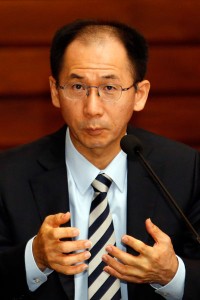IMF positive on SL economic progress
The International Monetary Fund (IMF) on Friday asserted their confidence in the government’s achievements in line with their programmes in meeting targets set out to bring about economic stability and increase its revenues following the implementation of the new Inland Revenue Act in 2018.

IMF mission leader Jaewoo Lee
The fiscal economic policy has been strong and the government’s level of international reserves met the targets set out by the IMF, the organisation’s mission leader Jaewoo Lee said at a media conference in Colombo at the Central Bank on Friday.
But the IMF believed that the Central Bank should continue to “remain vigilant in monitoring inflation pressures and stand ready to tighten monetary policy if needed to contain inflation or credit growth.”
Mr. Lee was in the country as head of the team of the IMF that held discussions with the government on the third review of the government’s economic programme supported by a three-year Extended Fund Facility. Sri Lanka had been given two tranches previously and the third tranche would take place on the recommendation of the IMF Board, it was pointed out based on the current reviews.
The IMF mission commended the government’s efforts in implementing its economic reform programme through end June 2017 and the “landmark” Inland Revenue Act legislation passed by Parliament.
The IMF remained satisfied with the government’s progress in increasing its international reserves and in reaching the targets set out for economic reform.
Mr. Lee explained that due to the country facing the worst climatic conditions of a drought and severe floods Sri Lanka’s GDP growth and inflation had “difficult performances” this year.
He said that Sri Lanka would be able to achieve an overall growth of below 4.5 per cent by the end of the year with the ability to improve next year. In this context he noted that the agricultural sector was expected to perform better next year since the country has now moved out of the worst climatic conditions and expected a resurgence of the infrastructure projects in the country.
Mr. Lee explained that the current account deficit was projected to widen somewhat this year due to higher imports of food and fuel related to the drought and floods.
Further, capital inflows would continue supported by improving market confidence from the progress in reforms, he noted.
Moreover, he explained that the passing of the Inland Revenue Act that should provide a solid foundation in government finances for a systematic and transparent tax regime.
The next challenge would be the smooth implementation of the new Act in 2018 that is tipped to boost government revenue, Mr. Lee pointed out.
In addition, the mission wants a further strengthening of the debt management as the government seeks assistance from the IMF to improve government finances.
The IMF also noted that they were keen on seeing an acceleration of the implementation of structural reforms in public financial management and State Owned Enterprises (SOEs).
Large financial obligations of SOEs pose fiscal risks and need to be managed by enhancing oversight of performance indicators, developing SOE-specific reform strategies, and following through on fuel and electricity pricing reform.
In addition Mr. Lee said they saw an improvement in the trade and investment climate, which will help bolster competitiveness and boost private sector-led growth.


